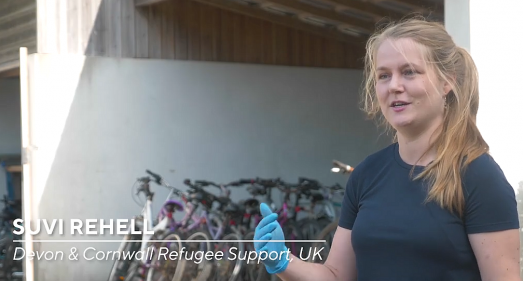“The activities we designed aim to solve everyday problems asylum seekers face”
07/12/2020

The UK partners of the EU-supported MOVE Beyond project, StreetGames, SPARC and Devon & Cornwall Refugee Support, looked beyond sport to meet essential needs among asylum seekers through physical activity. Suvi Rehell tells how they achieved extraordinary results in their pilot project with a simple approach.
Our collaboration is very much a story of a grassroots asylum seeker/refugee support organisation, such as the one I represent, and sport organisations on the local and national level coming together in the UK. Everything we wanted to do addressed real life issues and needs.
I work for Devon and Cornwall Refugee Support, which is a grassroots organisation working with asylum seekers who have been housed in Plymouth while they wait for decisions and information on their legal cases and from the Home Office.
An asylum seeker in the UK lives in a very restricted system. They’re not entitled to take employment, they have very limited access to education and they mainly speak English as a second language. You’re not entitled to benefits and you’re living off an asylum seeker allowance of roughly £37 a week, which works out to about £5.50 a day. If you’ve ever been to the UK, you’ll know that for £5.50 you can just about get a lunch or you can maybe get a bus day ticket to get around. So transport is always a real issue.
What I wanted to bring to the collaboration with sports organisations was to address these very real needs people face every day. I wanted to bridge the humanitarian and the sports organisations and see what sports can offer to the humanitarian needs and make a difference to people’s quality of life beyond the sports activity itself.
The bike project (featured in the video above), being the first example of our pilot project activities, started from a very real need for transport. It was a joint idea from myself and Ronnei, who had just gotten a refugee status after a year-long battle. He’s a mechanic and I ran a drop-in centre for asylum seekers and saw dozens of people every day.
The idea was simple: to rent a space at a friendly local bike shop and provide bicycles for people most in need. Why? Because a bicycle would allow people to travel to and from essential meetings, give freedom to explore beyond their current surroundings and neighbourhoods and it was also something that was theirs to keep.
Then there was the unexpected result of Ronnei impressing the place so much that in January, before the lockdown, he was offered a job at a time when people suddenly became scared of public transport and wanted a bike.
The second activity we set up was a walking scheme to take asylum seekers who were new to their city around the local area. In the UK the asylum seeker accommodation works by a no-choice basis, so you are sent to a location somewhere in the UK where you one day get a letter saying your new address is in Plymouth, which most people have never heard of. So this is a real, tangible form of integration.
We took groups to areas of exceptional coastal nature and beauty. Our criteria were that the walks had to be free of charge, easy to get to and they could be repeated by the clients by themselves. We know how much nature can increase happiness, decrease mental distress and positively affect cognitive function.
Thirdly, we initiated a city-wide collaboration of humanitarian and grassroots sport organisations to bring wifi boxes to asylum seekers. Not necessarily a very sporty thing to do, however in the time of Covid we found that a lot of people don’t have a means of communicating. They don’t have mobile phones and they certainly don’t have the money to buy data packages. So all of a sudden this was really quite essential and it provides people a sense of normality and independence, and inclusion rather than exclusion. You can share online sports tutorials or yoga videos, which people did.
So through the activities we designed in our collaboration, we focused on giving people the freedom to become more independent, to be able to do more for themselves and by themselves, and to solve real everyday problems asylum seekers face.
We offered activities that can continue in spite of hardship and that people can take with them to continue to improve their lives as they themselves move on, and as the national situations around us move on.
And we found that if you utilise the skills of people in the community, a lot of things just happen by default. You empower and involve those from the community and you address the actual needs and issues of the community. You will access the right people and the ones who have been the hardest to reach suddenly become the easiest to reach.
You also create a new culture of what is possible.
This story is an edited transcript from the MOVE Beyond workshop held during ISCA’s online conference on Integration of Refugees Through Sport. You can watch the full version here
Listen to the podcast from Devon & Cornwall Refugees Support, StreetGames and SPARC about their pilot project: Why our activities are more sustainable than traditional team sports
Find out more about the MOVE Beyond project, supported by Erasmus+ Sport Collaborative Partnerships.
Posted on 07/12/2020 by Suvi Rehell, Devon & Cornwall Refugee Support, UK

